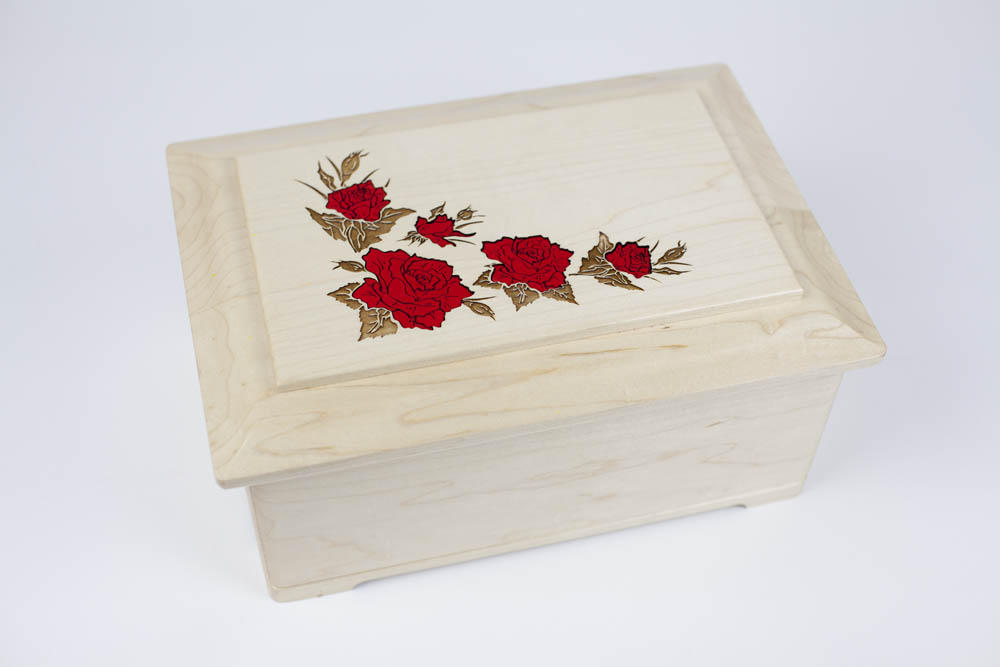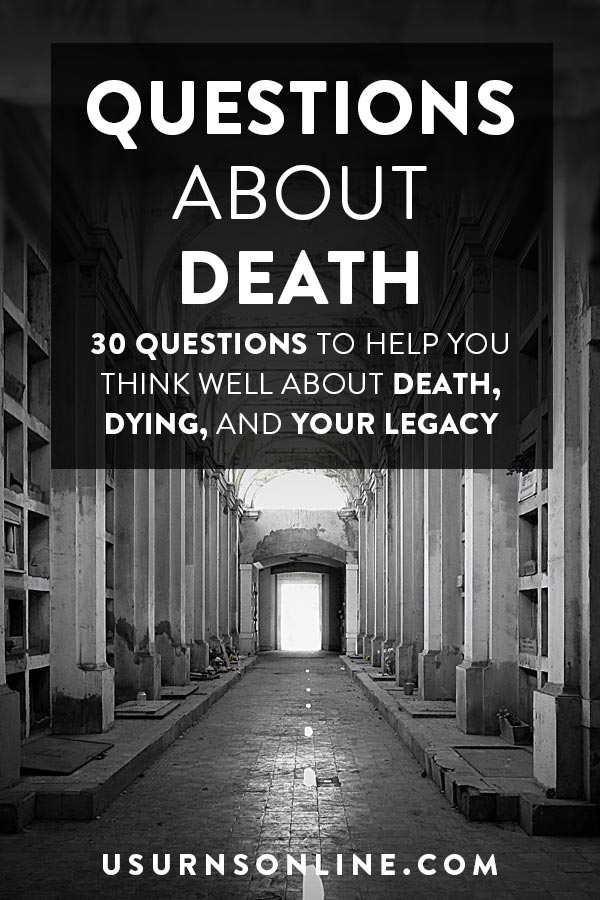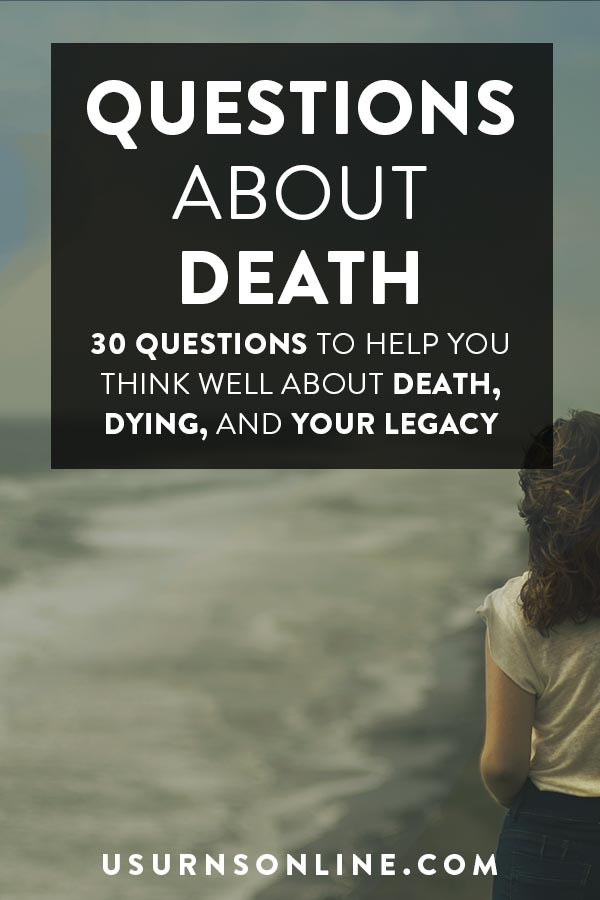Questions about death are a normal, healthy part of living well. While you may have questions about the physical, physiological, and psychological aspects of dying, those aren’t the questions you’ll find here. And while I’m sure you have questions about the afterlife, philosophy, and religion, we’re not trying to provide answers.
Instead, these questions are designed to help you think about your legacy and what it means to die well.
Below we’ve curated 30 or so open-ended questions to get you thinking about death and the meaning of your life.
Take your time and think about each one. Feel free to print them out and write your answers down. This practice can be for your own personal enrichment or as a way to start organizing your thoughts for your end-of-life planning.
**PLEASE NOTE**
These questions are meant to inspire introspection and self-evaluation to help you improve your quality of life. If you find that you are contemplating ending your life, there is a qualified professional who is ready and willing to talk or chat with you here.
Please, please know that we care about you and wish for you to have a long, healthy, and happy life. There are many people who care about your welfare and would be happy to talk to you.
This list of questions about death, dying, and your legacy is an extension of our care for you. We think there can be great value in a balanced contemplation of life and death so that you may lead a robust, wholesome, long, and joyful life.
30 Questions About Death
1. If I was to die today, what would I regret not doing?
2. What will matter to me most when I am on my deathbed? How can my life today align better with that?
Urns Made in the USA
3. In what ways can it be healthy to contemplate death? In what ways can it be unhealthy to contemplate death?
4. How can I treasure life all the more knowing that I will someday die?
5. How can I treasure the people in my life more knowing that they will someday die?
6. What does it mean to leave a legacy?
7. How would I like to be remembered?
8. Would I rather have more people at my wedding or at my funeral? Why?
9. What would my last meal request be?
10. What am I most proud of?
11. What will happen to my body when I die? Should I be cremated or buried?
More: Burial or Cremation: Which is Right for You?
12. Will I donate my organs?
13. What should my epitaph be?
14. What would others say about me, and what do I hope they would say?
15. What ceremonies should be performed prior to and after my death?
More: How to Plan a Funeral
16. Would I want to know the date and manner of my death? Why or why not?
17. What is the worst way to die?
18. What is the ideal way to die?
19. Do I want to die at home or in a hospital/hospice? How can I make this happen?
Dying at home in the way you choose is a major emphasis of and reason for “death doulas.” You can read more here.
20. Why is death at age 80 different from death at age 10? What about ages 70 vs 20, or 60 vs 30, or 50 vs 40?
21. Where will I go when I die?
22. What am I willing to die for?
23. Am I afraid of death?
24. What situation(s) would cause me to welcome death?
25. What would I say to a friend or family member who is facing death?
26. What can I learn from the death of a loved one?
27. What can I learn from my own inevitable death?
28. Should I prepare for death?
29. How can I prepare for death and dying?
30. What does it mean to die well?
Resources to Help You Find Answers for Your Questions About Death, Dying, and Your Legacy
Again, if you are thinking about ending your life we would recommend that you call or chat with someone here.
Here are some of the best resources to help you find guidance and perhaps some meaningful answers to your questions about death, dying, and more.
- Dying Process: 10 Things to Know About What Happens When You Die
- Organ Donation: How Organ Donation Works
- Planning a Funeral: How to Plan a Funeral
- Final Wishes: 5 Steps to Make Sure You Funeral Plans Are Followed
There are many resources out there that address a wide range of philosophical, spiritual, and theological perspectives on death. I can’t even begin to list them all, but I can share with you what has most helped me in my own life.
The perspective on death that rings true to me is the Gospel, which means “good news,” and it’s the good news that we don’t need to fear death because God, who created us, has prepared a way for us to triumph over death by believing in his son, Jesus Christ, who died in our place so that we might live with him in his resurrection.
Here’s a brief yet thorough overview of what this means:
How do you measure a life?
How do you measure a life?
One way people try is with a memorial. Sometimes it is a plaque or art piece, sometimes a photo album, other times it’s the cremation urn.
This last one is what we think about a lot, because we provide beautiful and meaningful funeral urns to grieving families all across the USA and beyond.

But here’s the thing: you can’t measure a life with a memorial. It simply can’t be done.
People are way more interesting, complex, and beautiful than an urn, no matter how well-crafted or uniquely suited to the person’s interests, hobbies, or character. People are always going to be more fascinating and more subversive and funnier and quirky and more complicated than any park bench or engraved plaque can communicate.
And that’s a good thing.
So we encourage you to get a gorgeous cremation urn to remember you beloved. Choose something unique and different. Honor their memory with a video montage, a memorial photo album, a all-out party for the “celebration of life.” List off their accomplishments, degrees, lives saved, commendations, awards, charitable works. Detail their passions, hobbies, interests, skills, talents. Describe their character, values, family, triumphs, and more.
At the same time, you can be completely honest knowing that your memorial will never measure up to the person it intends to honor.
And that, when you think about it, can be a very good thing.
I hope that you have found these resources and questions about death to be helpful. Please, if you have any thoughtful and reflective questions about death that will help others think more clearly about what they value, what they believe, and what they want to be remembered for, share them in the comments below!
Read Next: How to Craft a Life Worth Passing On





